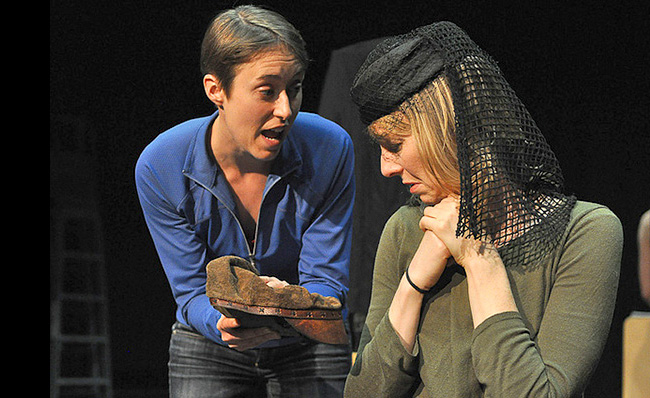
‘Learning play’ pushes Stanford scholars and actors to explore the contradictions of capitalism
Stanford Summer Theater and the Center for Ethics in Society partner to produce The Exception and the Rule, a Bertolt Brecht "learning play" that explores themes of inequality and corruption.
The Stanford Summer Theater production of Bertolt Brecht’s play The Exception and the Rule is a uniquely Stanford affair: a classics student is acting in it, a music student wrote the score and a drama professor is the director.
The multidisciplinary academic involvement is particularly fitting, since the show is one of the German playwright’s “learning plays,” or Lehrstücke, written in the 1930s to educate workers and students about socialist politics.

Charles Russo
Performed in factories and schools, the short plays were meant to illustrate the inherent – and sometimes inhuman – contradictions of capitalism.
Between April 25 and 27, Rush Rehm, a professor of classics and drama at Stanford, will direct six performances of The Exception and the Rule. A preview performance is scheduled for April 24. Faculty members, including Vice Provost of Undergraduate Education and drama Professor Harry Elam, will take part in post-performance discussions with the audience.
The Exception and the Rule tells the story of a wealthy merchant who must cross a fictional desert to close an oil deal. In a thought-provoking parable, Brecht exposes the class differences between the profit-hungry merchant and his working-class porter.
The production is part of a two-year exploration of the ethics of wealth sponsored by the McCoy Family Center for Ethics in Society. The production is the third theatrical partnership between Stanford Summer Theater and the Ethics Center.
“The play,” said Ethics Center Director Debra Satz, “looks at how legal justice is unequal for the rich and the poor. The ‘learning play’ format makes issues of inequality and injustice accessible to students and the broad public.”
A scholar of Greek drama and artistic director of Stanford Summer Theater, Rehm started studying the script in the fall and became deeply immersed in the themes of the play.
While presented as part of the Ethics Center’s Ethics of Wealth series, Rehm is quick to point out that this story isn’t quite “ethics of wealth” but rather “ethics about a system that tries to produce wealth.”
Performance aims to educate without emotion
Under Rehm’s direction, the actors’ relationships with their characters evolved over the weeks of rehearsal.
Actor Carolyn MacDonald, a doctoral candidate in classics, first perceived her character, the merchant’s guide, as a nice guy. But she said Rehm changed her perspective.
While MacDonald admits she wanted to sympathize and relate to her character, Rehm had a different vision. In fact, during the rehearsal process MacDonald said she had to fight impulses to sympathize with the character.
MacDonald also said she put tremendous thought into her lines, especially her monologue.
“I’ve never spent so much time trying to figure out the key words [of a script] and how precisely they fit into the motifs of the rest of the show,” she said.
Rather than try to make the audience “fall in love” with the characters, Rehm pushed MacDonald and the other actors to play their roles without bias.
Although a good cry or laugh can indulge the audience’s sympathy, Rehm said, an emotional response from the audience doesn’t really allow it to understand the systems at work in Brecht’s carefully crafted lines.
Brecht, Rehm said, is “attacking our love affair with ourselves. … Brecht wants an audience that’s critical, one that remains distant in order to analyze.”
Brecht doesn’t intend to produce strong emotional sympathy with any particular character, Rehm said. The playwright has a very clear, and very didactic, message about the relationships among labor, capitalism and exploitation. The goal is to show the members of the audience how exploitation works rather than convincing them of the negative effects of exploitation by making them feel a certain way.
A musical interpretation of class warfare
Since sheet music for the original German work and scores written thereafter are unavailable, Michael St. Clair composed new music and slightly reworked Brecht’s song lyrics.
St. Clair, a doctoral student in the Theater and Performance Studies Department, wrote songs that would help convey what was happening in a particular moment, rather then emote the overall didactic message of the play.
When a song plays during The Exception and the Rule, St. Clair explained, there is a shift in mood: It departs from “neutral, ‘things as they happened,’ descriptive acting” and the audience gets a “lyrical description of the system or the experience of one or more of the characters within the system.”
Such is the case with Tribunal Song, which is heard after the merchant is first accused of murder.
“Here,” St. Clair said, “I have this very harsh minor key music with jumps. It’s aggressive, ominous and accusatory.”
The Stanford Summer Theater, a professional company that gives Stanford students experience working on and off the stage, is in its 15th year.
The Exception and the Rule will be performed at The Nitery Theater. Tickets are free and the play is open to the public, but seats should be reserved in advance through the Stanford Ticket Office. A limited number of standby tickets will be available for each show at the door.
